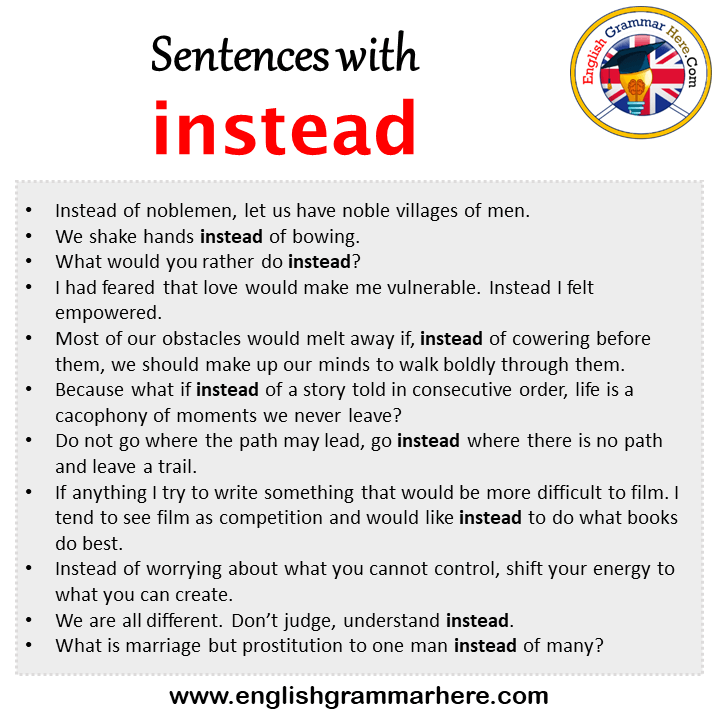Exploring The Use Of "Instead" At The Beginning Of Sentences
Language is a dynamic and ever-evolving tool that we use to communicate thoughts, emotions, and ideas. One of the fascinating aspects of the English language is its flexibility, allowing speakers and writers to construct sentences in various ways. One question that often arises is, "Can you start a sentence with instead?" This inquiry delves into the nuances of sentence structure and the proper usage of transitional words in English. The word "instead" serves as a powerful transitional phrase that can enhance clarity and flow in writing. When used correctly, it can guide readers through contrasting ideas or offer alternatives in a concise manner.
Understanding whether "instead" can kick off a sentence requires a grasp of its function within the context of a conversation or narrative. Many writers may hesitate to begin a sentence with this word, fearing it may disrupt the grammatical flow or confuse the reader. However, when used appropriately, starting a sentence with "instead" can effectively convey a shift in perspective or introduce a contrasting idea. In this article, we will explore the various usages of "instead," including its placement at the beginning of sentences, and provide examples to illustrate its effectiveness.
In the following sections, we will address common questions surrounding the use of "instead," examine its grammatical implications, and offer practical tips for incorporating it into your writing. By the end of this exploration, you will have a comprehensive understanding of how starting a sentence with "instead" can enhance your communication skills.
What Does "Instead" Mean?
"Instead" is an adverb that indicates a replacement or an alternative to something mentioned previously. It serves to highlight a choice between two or more options and is often used to express a contrast. For example, in the sentence, "I wanted to go for a walk; instead, I stayed home," the word "instead" signals a change in the speaker's plan.
Can You Start a Sentence with Instead?
The short answer is yes! You can indeed start a sentence with "instead." This usage is particularly effective when you want to emphasize a contrasting idea or provide an alternative to a previously stated thought. For instance, "Instead of going to the party, I decided to stay in and read a book." Here, the word "instead" sets the stage for the alternative action the speaker chose.
How to Use Instead at the Beginning of a Sentence?
When starting a sentence with "instead," it is crucial to ensure that the sentence flows logically from the previous statement. Here are some tips for proper usage:
- Ensure that the previous sentence introduces an idea that can be contrasted.
- Follow "instead" with a complete thought that provides the alternative or contrasting idea.
- Use a comma after the introductory word if needed to clarify the sentence structure.
Are There Any Alternatives to "Instead"?
While "instead" is a powerful transitional word, there are several alternatives that can also effectively convey contrast or substitution. Some of these include:
- Alternatively
- On the other hand
- Rather
- In place of
Each of these alternatives might fit better in certain contexts, so it's beneficial to have a variety of options at your disposal.
What Are the Common Mistakes When Using Instead?
Even though "instead" can start a sentence, there are common pitfalls to avoid:
- Failing to connect the contrasting ideas: Ensure the previous sentence relates to the one beginning with "instead."
- Overusing the word: While it is effective, excessive use can lead to redundancy.
- Misplacing commas: Incorrect punctuation can confuse the reader.
Can You Start a Sentence with Instead in Formal Writing?
In formal writing, starting a sentence with "instead" is generally acceptable, provided that it is used appropriately. It can add clarity and coherence to your arguments or analyses, particularly in essays or reports where contrasting ideas are prevalent. However, be cautious about the tone and context, as some formal situations may require more traditional sentence structures.
How Does Starting with Instead Affect Your Writing Style?
Beginning a sentence with "instead" can significantly impact your writing style by introducing a more conversational tone. It allows for a smooth transition between contrasting ideas, making it easier for readers to follow your argument or narrative. By incorporating this structure, you can create a more dynamic and engaging writing experience.
Examples of Using Instead at the Start of Sentences
To illustrate the effectiveness of starting sentences with "instead," consider the following examples:
- “Instead of rushing to finish the project, I took my time to ensure quality.”
- “Instead of complaining about the weather, I decided to embrace the rain and enjoy it.”
- “Instead of arguing, we should seek common ground.”
Conclusion: Embracing Flexibility in Language
In conclusion, the question, "Can you start a sentence with instead?" is met with a resounding yes. This versatile word can serve as an effective tool for transitions and contrasts in your writing. By understanding its usage and incorporating it thoughtfully, you can enhance your communication skills and present your ideas more clearly. Embrace the flexibility of language and experiment with different structures to find what works best for your unique style.
Unraveling The Lives Of Blueface's Brother And Sister
Unraveling The Complex Relationship Of Rich Dollaz And Moniece
Embracing Love Through Mother Teresa's Wisdom: A Family Perspective


